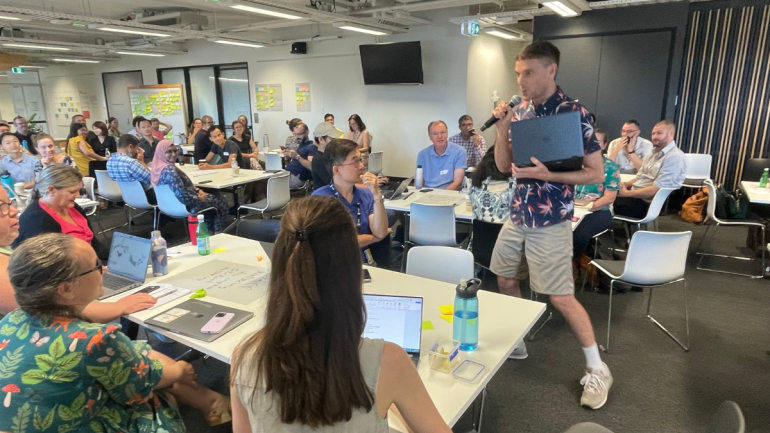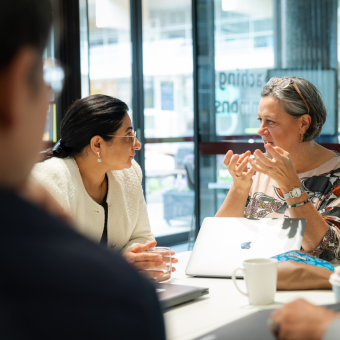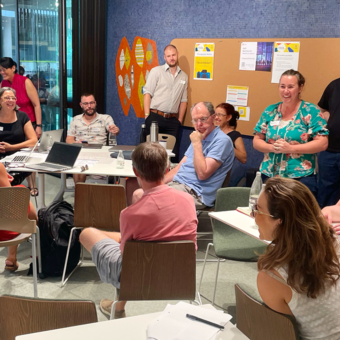By Dr Cherie Lucas (UNSW Medicine & Health), A/Prof. Helen Gibbon (UNSW Law & Justice), Dr Benjamin Phipps (UNSW PVCE Portfolio) and Prof. Patsie Polly (UNSW Medicine & Health)
The authors are all #UNSWNexus Fellows – learn more about the program here.
Strengthening academic impact through cross-faculty collaboration: A UNSW Nexus Program Initiative
Published 4 September 2024
In higher education, the landscape of knowledge creation and innovation is increasingly shaped by collaboration. Collaboration typically occurs within a discipline, where perspectives may be similar. Complex challenges, however, often require diverse perspectives, expertise and approaches to achieve comprehensive solutions. Cross-faculty collaboration addresses this issue. It provides academics with opportunities to learn new skills and perspectives and can have a transformative impact on academic and professional development. Improving teaching capabilities through such collaborations ultimately improves the educational experience for students, especially diverse student cohorts.
The UNSW Nexus Program creates the opportunity for 41 academic fellows and 24 educational developers placed across UNSW schools and faculties to collaborate on education-related projects, bringing together cross-disciplinary insight and expertise from all aspects of higher education. This dynamic, innovative initiative enables local education experts to drive, support and implement education reform through a “collaborative, streamlined and agile” approach. By aligning UNSW’s educational expertise with strategic projects and stakeholders, the UNSW Nexus Program aims to transform the student experience through effective cross-faculty collaboration and a whole-of-institution initiative.
As part of UNSW’s strong culture of cross-disciplinary communities focused on education initiatives, the Nexus program builds on previous successes such as the award-winning UNSW Education-Focussed Program and Communities of Practice, the UNSW Education Festival and the UNSW Scientia Education Academy. Specifically, it brings colleagues together to work on strategic issues collectively identified by UNSW leadership and the Nexus Community of Fellows and Nexus Educational Developers (NEdDevs).
What is cross-faculty collaboration?
Cross-faculty collaboration brings together people from diverse disciplinary backgrounds to work towards shared goals. This may include educators, educational designers, researchers and professional staff. Each faculty – whether in the humanities (such as languages, arts, social sciences or law) or STEM (science, technology, engineering and mathematics) – brings unique perspectives, strategies and approaches to problem-solving.
When these collaborators converge, they create fertile ground for innovative thinking, “fuel their collective knowing” and provide a more holistic way of thinking about complex issues.
For instance, a collaboration between engineering and law educators could yield insights into the ethical or regulatory implications of technological advancements, such as the impact of generative AI on higher education, that might otherwise be overlooked. Such collaborations bridge the gap between innovative technologies and expectations about their use. Similarly, partnerships between researchers from arts/communication/design and the sciences could inspire creative solutions to scientific-communication challenges, bridging gaps between technical knowledge and the public’s understanding of complex topics.
Cultivating transferable skills
Beyond sharing disciplinary knowledge, cross-faculty collaboration cultivates a range of transferable skills essential for academic and professional success. One of the most prominent skills is communication. Interaction with colleagues from different disciplines requires clarity in articulating ideas across disciplinary boundaries, which in turn requires developing effective oral and written communication skills. In the context of such interactions, critical friends can probe one another’s ideas and seek more information to develop their own understanding of different disciplinary perspectives.
Critical thinking through engagement with reflective practices is also sharpened through cross-faculty collaboration. Engaging with diverse perspectives challenges individuals to confront their own assumptions, consider alternative viewpoints and synthesise complex information – a process that nurtures intellectual agility and depth. These interactions help individuals better understand their own perspectives, and thus make better cases for positive educational transformation in their local teaching contexts.
Cross-faculty collaboration nurtures teamwork and collaboration skills. Working in diverse teams enhances collegiality and the ability to navigate interpersonal dynamics, make the best use of collective strengths and negotiate differences in opinions or approaches. These experiences are invaluable in preparing individuals for collaborative ventures in academia, research and professional work environments. The synergy of cross-faculty collaboration often sparks innovative approaches to longstanding challenges. By combining expertise from different faculties, institutional, sector and societal needs can be addressed in more comprehensive and sustainable ways.
Navigating challenges and maximising opportunities
While the benefits of cross-faculty collaboration are abundant, it also presents many challenges, including working with different personalities, bridging terminology knowledge gaps, managing divergent ideas and timelines and aligning approaches that may differ between faculties. Addressing these challenges requires patience, mutual respect and a commitment to collaborative problem-solving – skills that are themselves honed through cross-faculty interactions and teamwork. In the context of the UNSW Nexus Program, we navigate and embrace differences in perspectives, skills and backgrounds to make higher education more effective, equitable and supportive, and more capable of producing students with the necessary skills to take on future challenges.
We are all strengthened by our differences and by the challenges of cross-discipline collaboration.
As the UNSW Nexus Program evolves, interdisciplinary and cross-faculty collaboration remains a powerful catalyst for advancing knowledge through sharing different perspectives and existing and new pedagogical frameworks to meet the university’s educative priorities. There is immense value in engaging academics and education developers from different faculties and drawing on their different skillsets in a team environment to produce academic outcomes with rigour and transform the student experience.
What initiatives are other institutions undertaking to encourage cross-faculty education collaboration?
***
Reading this on a mobile? Scroll down to learn about the authors.
References
- Craig CJ, Turchi L, McDonald DM. Cross-disciplinary, cross-institutional collaboration in teacher education: Cases of learning and leading. 1st 2020. ed. Cham: Springer International Publishing; 2020.
- Gurr D, Huerta M. The role of the critical friend in leadership and school improvement. Procedia, Social and Behavioral Sciences. 2013;106:3084-3090.
- Walpola R, Lucas C. Reflective practice: The essential competency for health systems and healthcare practitioners during the COVID-19 pandemic. Reflective Practice. 2021;22(2):143-146.
- Tsingos C, Bosnic-Anticevich S, Smith L. Learning styles and approaches: Can reflective strategies encourage deep learning? Currents in Pharmacy Teaching and Learning. 2015;7(4):492-504.
- Lucas C, Power T, Ferguson C, Hayes C. Enhancing pre-licenced pharmacists' communication and interprofessional collaboration utilizing the RIPE model of interprofessional learning: A qualitative study. Research in Social and Administrative Pharmacy. 2020;16(10):1379-1386.
- Lucas C, Power T, Kennedy DS, Forrest G, Hemsley B, Freeman-Sanderson A, Courtney-Harris M, Ferguson C, Hayes C. Conceptualisation and development of the RIPE-N model (reflective interprofessional education-network model) to enhance interprofessional collaboration across multiple health professions. Reflective Practice. 2020;21(5):712-730.
- Lucas C, Power T, Hayes C, Ferguson C. Development of the RIPE model (Reflective Interprofessional Education Model) to enhance interprofessional collaboration. Research in Social and Administrative Pharmacy. 2019;15(4):459-464.


